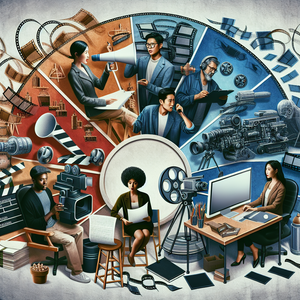Diverse Paths to Production: Unconventional Career Opportunities

Production assistants (PAs) are commonly regarded as the entry-level gatekeepers of the film and television industry. These individuals are responsible for a myriad of tasks that are crucial to the production process, from organizing equipment to managing schedules. The role of a PA is both challenging and rewarding, offering a unique opportunity to gain firsthand experience on set. Example: A production assistant on a film set may find themselves helping to set up lighting one minute and running to grab coffee for the director the next. This dynamic environment allows PAs to observe the intricate workings of a film set, forge relationships with key industry players, and develop a comprehensive understanding of the production workflow. Many successful producers began their careers as PAs, making this role a vital foundation for future advancement.
Line Producers: The Budget Wizards
As one progresses in the production hierarchy, the role of a line producer becomes increasingly significant. Line producers are tasked with managing the day-to-day operations of a production, ensuring that it adheres to the budget and schedule. Their responsibilities encompass coordinating logistics, hiring crew members, and managing resources, making them integral to the production process. Example: Consider a line producer overseeing a major feature film. They would create a detailed budget, allocate funds for various departments, and troubleshoot any issues that arise during filming. This role demands exceptional organizational skills, problem-solving abilities, and a solid understanding of financial management. Aspiring producers can greatly benefit from the experience gained in line producer roles, as it equips them with the necessary tools to handle the complexities of larger productions.
Associate Producers: The Creative Collaborators
Another pivotal role in the production landscape is that of an associate producer. While their specific responsibilities can vary, associate producers typically work alongside lead producers to facilitate various aspects of production, such as script development, talent coordination, and post-production processes. This position allows for a more hands-on approach to the creative side of filmmaking. Example: An associate producer may collaborate closely with the director to refine a script or work with editors to shape the final cut of a film. Such involvement not only enhances their creative skill set but also allows them to build a robust network of industry contacts. Many successful producers credit their time as associate producers as a crucial phase in their journey, as it provides both creative insight and valuable industry connections.
Skills Needed for Success
Though the skills required for each role may differ, certain qualities are universally beneficial in the production field. Strong communication skills, adaptability, and a passion for storytelling are essential for anyone looking to make a mark in the industry. Furthermore, being proactive and willing to take on various tasks can set aspiring producers apart in a competitive job market. 1. Communication Skills: Effective communication is vital in an industry where collaboration is key. Producers must be able to articulate their vision and coordinate with various departments. 2. Adaptability: The fast-paced nature of production often means that plans can change at a moment’s notice. Being adaptable helps professionals navigate unexpected challenges. 3. Passion for Storytelling: A genuine love for storytelling fosters creativity and drives individuals to bring compelling narratives to life.
The journey to becoming a successful producer is rarely a straight line; it often involves traversing through a series of unconventional career opportunities that provide invaluable experience and insights. Roles such as production assistant, line producer, and associate producer are not merely entry points; they are essential positions that contribute to the overall success of any production. By understanding the significance of these roles and the skills needed to excel in them, aspiring producers can carve out unique paths in the film and television industry, ultimately leading them to their dream careers. Embracing these diverse paths not only enriches their professional journey but also fosters a deeper appreciation for the collaborative nature of filmmaking. In an industry that thrives on creativity and collaboration, every role—conventional or unconventional—plays a crucial part in bringing stories to life.
Script Supervisor
Major film studios, independent production companies, and television networks
Core Responsibilities
Maintain continuity throughout the filming process, ensuring that all elements in scenes are consistent.
Take detailed notes on script changes, actor performances, and any variations from the original script.
Collaborate closely with directors and editors to provide feedback on takes and ensure the final cut aligns with the intended vision.
Required Skills
Strong organizational skills and attention to detail to track continuity errors.
Proficient in script analysis and familiar with screenwriting terminology.
Ability to multitask and communicate effectively with various departments.
Location Manager
Film production companies, television studios, and commercial production agencies
Core Responsibilities
Scout and secure locations for filming, ensuring they meet the creative and logistical needs of the production.
Negotiate contracts with property owners and manage location permits and insurance.
Coordinate logistics for location shoots, including transportation and accommodations for cast and crew.
Required Skills
Strong negotiation skills and experience in contract management.
Excellent problem-solving abilities to address unforeseen challenges in outdoor or remote locations.
Familiarity with local regulations and permitting processes related to filming.
Post-Production Supervisor
Film production studios, television networks, and post-production houses
Core Responsibilities
Oversee the post-production process, ensuring that all elements, including editing, sound design, and visual effects, are completed on schedule and within budget.
Coordinate between various post-production teams, such as editors, sound engineers, and colorists, to ensure a cohesive final product.
Review and approve cuts and revisions, providing constructive feedback to ensure the final product meets the creative vision.
Required Skills
In-depth knowledge of post-production software and workflows, including familiarity with editing software like Avid Media Composer or Adobe Premiere Pro.
Strong leadership and management skills to effectively guide diverse teams.
Excellent communication skills to articulate creative and technical feedback.
Casting Director
Casting agencies, film production companies, and theater companies
Core Responsibilities
Collaborate with producers and directors to understand the character requirements and vision for a project.
Organize auditions and casting calls, evaluating actors' performances to find the best fit for each role.
Negotiate contracts with selected talent and manage relationships with agents and actors throughout the casting process.
Required Skills
Strong networking abilities to maintain relationships within the acting community.
Keen eye for talent and understanding of character dynamics within scripts.
Excellent organizational skills to manage multiple auditions and schedules.
Production Designer
Film studios, television production companies, and advertising agencies
Core Responsibilities
Develop the visual concept of a film or television show, working closely with the director to create the overall look and feel.
Oversee the design and construction of sets, ensuring they align with the story and character development.
Collaborate with costume designers, art directors, and visual effects teams to ensure a cohesive aesthetic.
Required Skills
Strong artistic vision and proficiency in design software such as AutoCAD or SketchUp.
Ability to interpret scripts and translate them into visual environments.
Exceptional communication and collaboration skills to work with various creative departments.


